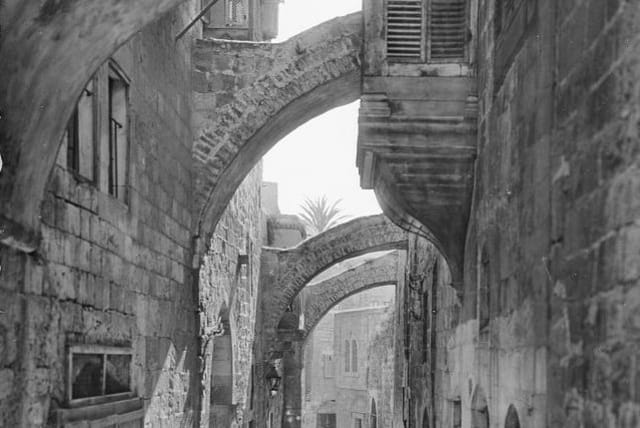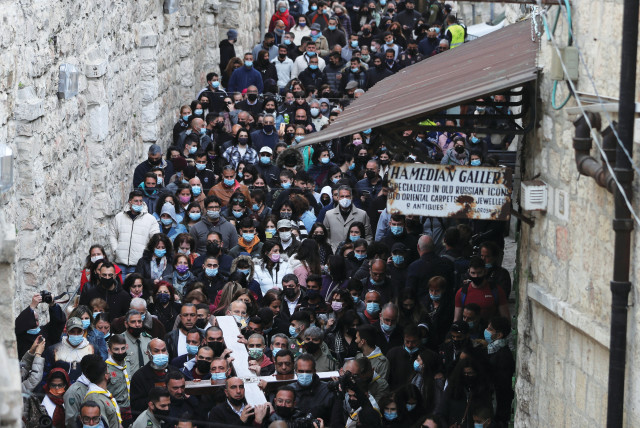Do more people love Israel than we think? - opinion

Happiness is good. Have I mentioned that in a poll that includes all ethnicities, we are among the happiest people in the world?
My Uber driver has arrived minutes after I put in the order. She rushes out of the van to help me with my suitcase. “I was already on my way home for the day,” she says. “I live by the lake, not too far from your hotel.” Her name is Lisa.
I’m feeling a little woozy from the early morning flight to Chicago as we head toward the highway. We make the usual polite driver-passenger conversation. Yes, Lisa was born in Chicago. Where am I from? she asks.
For most people in the world, that’s not a loaded question. But for us Israelis, there’s always that three-second pause, waiting for a reaction. Maybe I’m a little wary because I’ve read that hate crimes doubled in Chicago in 2022, and went up by 70% the year before that. Chicago is also hometown for Trinity Church, whose emeritus pastor is Jeremiah Wright.
“Israel,” I say. “Jerusalem, Israel.”
To my delight, Lisa launches into an excited paeon of praise for Israel. She’s recently visited with a tourist group. It was one of her best trips ever, and she ought to know. Soon she’ll have visited all seven continents, a personal goal. She has already signed up for a trip to Antarctica. But Israel is amazing, all the history and the great food. She loves hummus. Her Israeli guide was extraordinary. He knew everything.
Lisa is wearing shorts, but she tells me that she felt she wanted to cover herself when she walked the Via Dolorosa and when she touched the wall that Jesus had touched. The fifth station of the Via Dolorosa was where San Simon of Libya reportedly helped him carry the cross on the way to the crucifixion.
She shows me a photo on her phone. She’s draped in white as she walks the Old City streets in awe.
This is about the last kind of conversation I expected to have.
Lisa senses that I’m dehydrated and stops at a gas station convenience store, where I stock up on soft drinks and electrolyte-rich liquids.
She pulls her phone off the dashboard to share the rest of the trip images. A touch of home: her group floating on the Dead Sea.
Was she worried about visiting to Israel? “Some of my friends were surprised I was going,” she says, but hey, I’m from Chicago.”
A few words about Uber. There are a million drivers in the United States. Seven out of 10 reportedly work to support a child or a parent living at home. Many are minorities and immigrants.
As I get back to Israel, I’m thinking about Lisa, my favorite driver on my trip, wondering if she’s watching as President Isaac Herzog addresses Congress. Veteran Israeli that I am, I still get a thrill at the announcement: “Mr. Speaker, the President of the State of Israel.” Loud and long applause fills the room to welcome him. Herzog’s words lift the men and women who represent Democrats and Republicans from both houses out of their seats – 29 or 30 times, depending on who was keeping score.
Who’s counting?
Everyone, it seems. There have been human applause meters for decades.
With pride and delight, Indian media reported that Prime Minister Narendra Modi of India – the world’s most populous country – got 15 standing ovations when he addressed Congress a month ago. In 1935, Republicans refrained from clapping for Franklin D. Roosevelt’s State of the Union Address. Senator Sam J. Ervin Jr. reportedly refrained from applauding Richard Nixon once in 1974. Erwin was the head of the Watergate Committee. Nuances count. And for example, the Chicago Sun-Times took former vice president Al Gore to task for not clapping right.
Watching in Jerusalem, I felt uplifted and electrified by the sight of quarreling US politicians from both sides of the aisle rising to cheer the president of Israel. And yes, there were at least four state representatives who wouldn’t enter the hall to hear President Herzog: Alexandria Ocasio-Cortez of New York; Ilhan Omar of Minnesota; Rashida Tlaib of Michigan; and Cori Bush of Missouri. Rep. Pramila Jayapal from Washington, who called Israel a “racist state” and apologized after her remarks drew bipartisan condemnation, supposedly missed the speech because of a scheduling conflict.
I don’t know exactly how many persons were in the room, but a full joint session of Congress adds up to 535. You do the percentages.
If you missed the president’s speech, you can still catch it on the Internet. I liked how he mentioned his wife, Michal Herzog (eminent lawyer and proponent of soft power); his father, Chaim Herzog, a past president of Israel; and his grandfather Rabbi Isaac Halevi Herzog, former chief Ashkenazi rabbi of Israel, who also sought out hidden Jewish children who had survived the Holocaust.
Herzog’s speech felt personal, as well as lofty. Nor did he forget that this momentous day was also rosh chodesh Av, the start of the month when Jews everywhere lament the loss of our Temples in Jerusalem – the city he was born in. My favorite moment was Herzog’s framing our connection with the United States as a two-way alliance. “When the United States is strong, Israel is stronger. When Israel is strong, the United States is more secure.” Remarkable for a 75-year-old state.
I WATCH the legislators, the men in their dark colors and the women in red, white, and blue suits hailing our president, and I think that although they’re politicians, they can’t be faking it. I’m wondering if all of our concerns about the growing dislike for Israelis is overblown. When I think about it, even among the many immigrant taxi and Uber drivers who ask me where I’m from, not even those from Muslim countries badmouth Israel.
Why do I care how much people like us?
According to experts, our human need to be liked goes back to a primitive survival instinct; but as societies evolved, likability became a measurement of our self-worth. Harvard Business Review senior editor Vasundhara Sawhney recently published a list of how-to books that teach us how to get along with work colleagues we don’t like, or maybe even more importantly, those who clearly don’t like us. The need to be liked, some will argue, is a deep-seated psychological vulnerability. Other experts say it’s a lack of self-love.
Prime Minister Benjamin Netanyahu, speaking before Congress in 2015, described it [the US Congress] as “the most important legislative body in the world.” By the way, he received between 23-29 standing ovations, depending on whose count.
Can those threatening polls about the loss of affection for the State of Israel be right? I know that I feel joyful watching the Congressional hug. Happiness is good. Have I mentioned that in a poll that includes all ethnicities, we are among the happiest people in the world?
Lisa said she wasn’t scared of going to Israel.
Was I scared, coming to Chicago? she wanted to know.
I wasn’t. Until I realized that, while bonding and kvelling over images of the 75-year-old State of Israel, we were both looking at phone photos while driving along traffic-jammed US-12.
The writer is the Israel director of public relations at Hadassah, the Women’s Zionist Organization of America. Her latest book is A Daughter of Many Mothers.
Jerusalem Post Store
`; document.getElementById("linkPremium").innerHTML = cont; var divWithLink = document.getElementById("premium-link"); if (divWithLink !== null && divWithLink !== 'undefined') { divWithLink.style.border = "solid 1px #cb0f3e"; divWithLink.style.textAlign = "center"; divWithLink.style.marginBottom = "15px"; divWithLink.style.marginTop = "15px"; divWithLink.style.width = "100%"; divWithLink.style.backgroundColor = "#122952"; divWithLink.style.color = "#ffffff"; divWithLink.style.lineHeight = "1.5"; } } (function (v, i) { });

